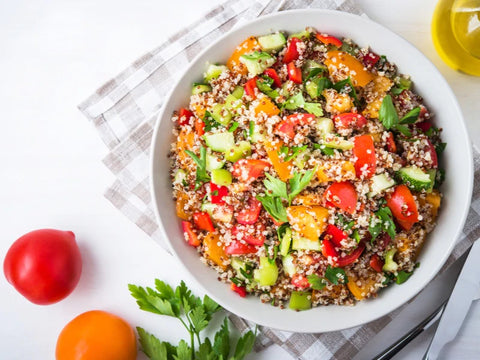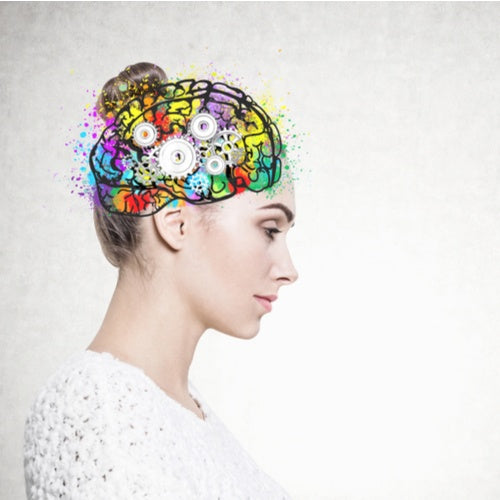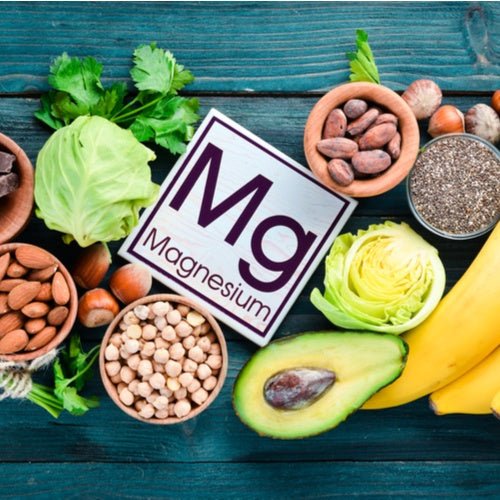Introduction
When it comes to making those big decisions in your life, is it your mind, your heart or your gut that calls the shots? While they sometimes seem to be in conflict with one another, making you confused as to what you really want, at a physiological level, they may have more to do with each other than what you first think.
In the last couple of decades, science has discovered an important link between your gut and your nervous system, earning your gut microbiome its nickname as the second brain. Since then, research in this area has seriously exploded with significant correlations shown between levels of stress and mood disorders and gastrointestinal related disorders. In fact, 40-60% of patients with functional gastrointestinal disorders experience psychiatric symptoms and up to 50% of psychiatric patients are diagnosed with irritable bowel syndrome. This phenomenon has become known as the “gut-brain axis.”
What Exactly Is It?
The gut-brain axis refers to a two-way communication pathway between the central nervous system, that is our brain, and the gastrointestinal tract. This two-way highway uses traffic lights, or signalling hormones, and all sorts of other fancy messengers to manage what we do and how we feel on a day-to-day basis.
A key player in this whole-gut brain axis set up is our gut ecosystem or microbiome. The microbiome is the ecology, diversity and spread of good and bad bacteria that inhabit the digestive tract. In fact, our bodies contain around 100 trillion bacterial cells! They definitely have the majority vote which is why it’s so important to make sure they’re the good ones.
Now the microorganisms in our gut directly impact the messages being sent to our brain. Like a double-edged sword, just as your mood influences and cause changes to your gut bacteria, your gut bacteria also influence your mood and this, in short, is what the whole gut-brain axis is about.
How Our Gut Affects Our Brain
Before we get to the role stress plays in our health, we’re going to look at the production and role of neurotransmitters in our mental health. Neurotransmitters are essentially chemicals that are released from nerve cells to other target cells to communicate information. They are like messengers and too much or too little of any of one neurotransmitter can change the way you think, feel and behave.
Whilst we often think of neurotransmitters being produced in the brain, a large majority of these little messengers are actually produced in the gut. In fact, more neurotransmitters are produced in the gut than in the brain!
Serotonin, for example, is often referred to as the “happy hormone”. It is well known for its role in regulating mood, appetite and sleep. Serotonin levels can play a part in mood disorders such as depression, obsessive-compulsive disorder and anger management problems. What you may not know about the neurotransmitter is that approximately 90% of it is produced by the bacteria in your gut! Certain types of microbes in the gut can directly stimulate the production and release of serotonin in the cells lining the colon. If your gut isn’t functioning properly, the cells and bacteria are not going to be able to produce enough serotonin to balance your mood and you’re not going to feel so swell.
Dopamine is another major neurotransmitter that plays an important role in attention, problem-solving and memory. On the two-way motorway, it acts as a traffic officer, controlling the flow of information to other areas of the brain. You’ve probably heard how dopamine is associated with reward-inducing mechanisms, in things that give us pleasure. So if you were to eat a piece of chocolate, dopamine would be released in some areas of the brain, allowing you to feel pleasure and giving you reason to keep reaching for another piece. What you may not know is that half of your dopamine is produced in the gastrointestinal tract.
You also need to have healthy gut bacteria in order to produce vitamin B12 and that plays a huge role in mental health. B12 deficiencies are a root case of neurological, psychiatric and cognitive issues and have been shown to be associated with depression. It can trigger symptoms in the nervous system and red blood cells and can impact your neurotransmitter pathways. If you’re not absorbing and digesting your vitamin B12, you’re not going to have the healthy serotonin or dopamine levels either.
What about the other way around?

How does stress impact our gut?
Conversely, alterations in the brain can also affect the ecosystem in the gut. Who hasn’t had that nerve-wracking job interview that upset our tummy for days?
When we are stressed or anxious, research shows that this increases harmful bacteria in our gut leading to feelings of anxiety or depression. In fact, people with depression or anxiety have actually been shown to have lower diversities of bacteria in their gut. Moreover, disturbances to this system have also been linked to other nervous system conditions such as obesity, addiction and eating disorders.
It’s interesting to note that 60% of patients with irritable bowel syndrome (IBS) indicate that stress is the factor triggering either the first onset or the exacerbation of symptoms. IBS is often associated with psychological issues and therapies such as cognitive behavioural therapy is known to be an effective adjunct treatment.
How else does stress impact our gut?
In response to stress (whether it’s perceived or actual), our body produces the hormone cortisol. Cortisol has many important functions in the stress response and impacts our gut function in various ways:
- It diverts blood away from the gut to your muscles (to fight or run from your stressor);
- It slows down the production of saliva in your mouth meaning the enzymes available to break down food is reduced (impairing digestion)
- It decreases prostaglandins, which protect your stomach from acid so you might have a more sensitive tummy when you are stressed;
- It slows down digestion or causes sudden diarrhoea, which might mean you aren’t absorbing nutrients as well;
- It downregulates your immune system
- It can cause the stomach and oesophagus to spasm.
All of this is fine in the short-term, but in cases where stress is prolonged and food isn’t digested properly, it can really play havoc on the delicate ecosystem found in your gut. So yes, having some stress management strategies to call upon is vital! Here are six tips to alleviating the stress in your life:
- Journaling your thoughts and practicing gratitude. Regularly expressing gratitude may help reduce the negative effects of stress and improve your overall wellbeing. Write down every day 5 things you are grateful for.
- Take a deep breath. Simply by taking a deep breath you can lower the levels of inflammation and stress hormones in your body! Shallow breathing is a signal that communicates to the body that something is wrong, that danger is present, and the body can release stress hormones accordingly. A few deep, diaphragmatic breaths a few times a day can be enormously healing and can help to blow away stress and its biochemical debris!
- Ground yourself in nature to help decrease too much positive charge that can build up in our bodies over time leading to both physical and mental health problems
- Exercise regularly. Aim for at least 30 minutes of exercise per day as it reduces stress, boosts endorphins, increases blood flow and improves sleep to mention just a few benefits.
- Connect with others around you and don’t be hesitant to ask for help if you need it. We are by definition social creatures, the highest form of torture being isolation. In recent years, emerging evidence has made it abundantly clear: loneliness may be the most potent threat to survival and longevity due to its physiological effects on our bodies.
- Finally, finding a life purpose makes living enjoyable. Living on purpose gives you direction, makes you feel alive and authentic and offers definite emotional, psychological and physical benefits.

What Else Can You Do To Optimise Gut Function And Support Your Mental Health?
What you eat is one of the most important factors influencing your health, including your mental health and clarity. The foods you eat are broken down and transformed by your gut microbiome to nourish and fuel the rest of your body. Diet is fundamental in determining the diversity of our gut microbiome and the metabolites, including those neurotransmitters that our gut species produce. Here are three ways you can alter your diet to build a healthier gut:
-
Avoid gut-destroying foods
It’s important to not only focus on foods that build our gut flora but also avoid those which destroy it. Avoiding foods which are packed with added sugar as this feeds the bad bacteria. Highly processed foods, artificial sweeteners, red meat and alcohol all have a negative effect on our gut microbiota and leads to inflammation. A diet high in saturated fats, such as those found in fatty meat, butter and cheese can also affect both the diversity and abundance of your good bacteria.
-
Eat plenty of fiber
Of all the major nutrient groups that we eat, fiber is the one component that directly feeds our gut flora. That is why it is so important we get enough of it. Our gut bacteria digests the fibre and produces short chain fatty acids which are tied to a myriad of health benefits. By eating fiber, we are pretty much ensuring those trillions of gut bacteria are well fed so they can keep us in good health. If they aren’t getting fed properly, their ability to create specific vitamins like B12 and B9, decreases, and impacts neurotransmitter synthesis and affecting your cognitive ability and mental health. You can increase your fiber intake through foods such as onion, garlic, bananas, pears, berries, chickpeas, legumes, nuts and seeds.
-
Focus on probiotic foods
Last but not least, in order to build a strong army of good microbes, eat plenty of foods rich in probiotics such as sauerkraut, kimchi, live yoghurt and kombucha. Probiotic supplements can also be very beneficial.
Studies have shown that probiotic therapy reduces depressive symptoms and improves the stress response as effectively as Citalopram or Diazepam, two very common antidepressant and anti-anxiety medications. In a 30-day study, healthy volunteers with no previous depressive symptoms were given either probiotics or antidepressants. Those given probiotics showed reduced cortisol levels and improved self-reported psychological effects to a similar degree as participants who received Diazepam. Some even say that in the future, we might find that these “psychobiotics” could restructure the gut microbiota to achieve society-wide control on mental illnesses!













What Do You Think? Comment Below: